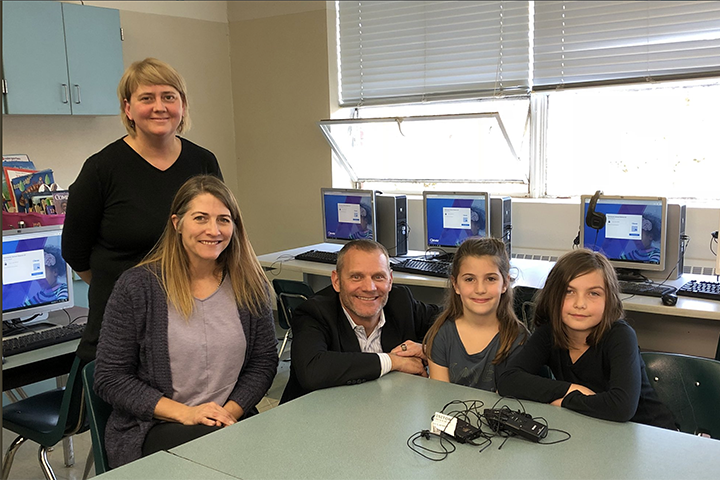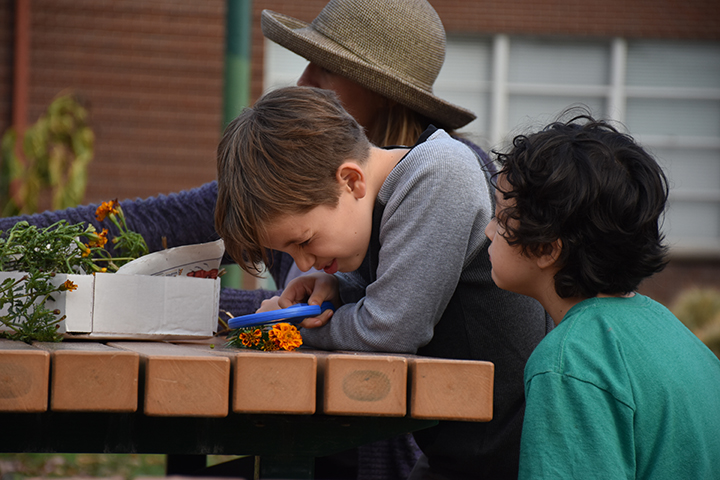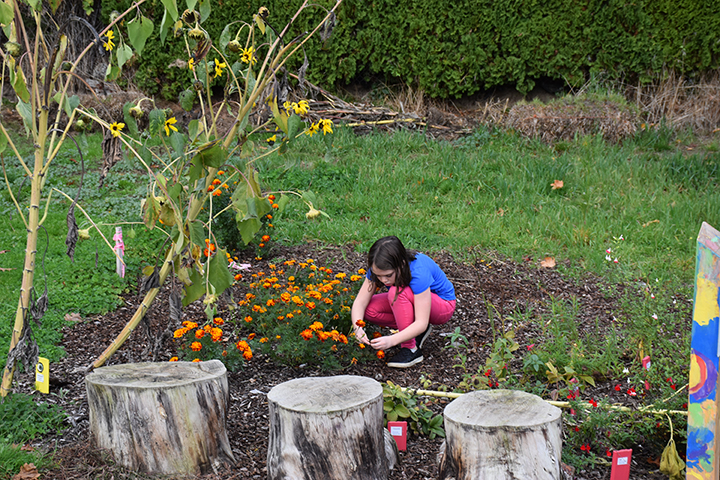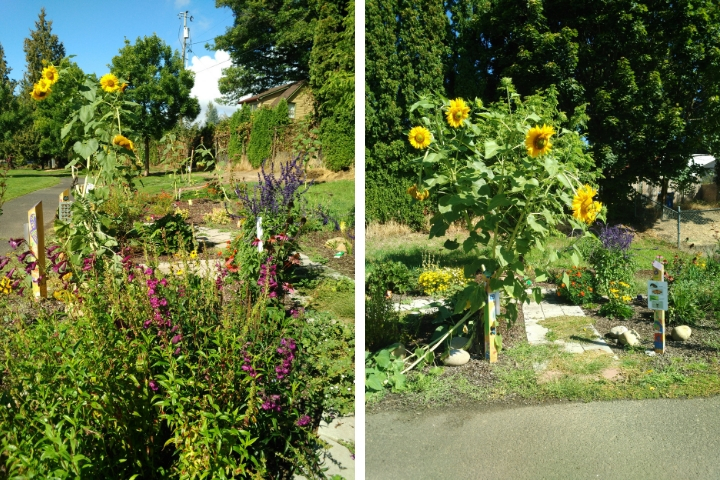First photo, from left: Jane Tesner Kleiner, Cheri Larsen, Steve Webb, Samantha and Karina
At Hough Elementary, students are engaged in learning about nature and taking care of their school grounds while they build their social-emotional skills. Families are involved in the effort, too. Learn about Hough’s unique horticulture therapy program, Green Team and Garden Club in this episode of the Inside Vancouver Public Schools podcast.
Hello and welcome to the Inside Vancouver Public Schools podcast. I’m Steve Webb, superintendent of Vancouver Public Schools.
Recently I visited Hough Elementary in downtown Vancouver to speak with a few of the folks in the school’s Green Team and Garden Club. They’re connecting kids to nature and working to make the school a more beautiful place.
Here’s our conversation.
Steve: Well thanks, everyone, for joining me this afternoon. We’re going to have a conversation about the Green Team and some gardening here at Hough Elementary. But before we begin, why don’t you tell me a little bit about yourself: your name, your grade or how you might be connected to Hough Elementary? We’re going to start with Karina.
Karina: My name is Karina and I’m in fourth grade and my mom used to go here.
Steve: Oh my goodness.
Karina: And I love cats.
Steve: You love cats? Oh, that’s very interesting.
Samantha: My name’s Samantha. I’m in third grade. My brother used to go here. Now he’s in seventh grade. We decided that it’d be a good school for me to go to.
Cheri: My name is Cheri and I am coordinating the Green Team and the Garden Club. We have a therapeutic garden program here at Hough.
Jane: Hi, my name is Jane and I’m a mom of a first-grader here. But my other son went here. He’s now in eighth grade. I helped start the Green Team six years ago or so with Eva Unger. So we’ve been running it ever since. So we’re happy to have more folks joining the program.
Steve: Well, tell me a little bit more about that, Jane. What was the inspiration behind starting the Green Team here at Hough? And just talk a little bit about the evolution of the Green Team over the past six years.
Jane: So Eva Unger, the former principal here at Hough Elementary, she had a great idea. She went to her staff and said to her staff, “What would you like to see in five years at Hough Elementary so that you can be a successful teacher?” And of all the things they said—air conditioning, heat, better windows, whatever program-wise—they wanted to have gardens at their school. So gardens have been used it a couple schools in Vancouver schools and around the community, but we wanted to take it further. So when we met with your staff, they said, “Come up with a master plan for the school and let’s see what all the features are that you’d like to have.” So we said OK. So we went to the students at the time and all the teachers and said, “So what would you like to see?” All the kids had amazing ideas, including zip lines out the library, which we did not present to you.
Steve: I would’ve been a big fan of the zip line, although I’m certain our risk management company would not have approved of that.
Jane: Kids still ask for that. But they wanted flower gardens. They wanted vegetable gardens. Our namesake is Paddy Hough. So what if we could grow potatoes? Tell the story of Paddy Hough through some Irish history. Flower gardens, some nature play elements, different types of play here at Hough. We have such a great campus with some beautiful trees, but lots of grass and pavement, so there wasn’t much to inspire the kids to explore their campus. So we came up with a whole big plan of about seven different phases. And so we’re building the last phase right now out here. Our new playground is going to be shaped like a treehouse, which is what the kids asked for. We’re really excited that we’re almost done building our master plan. But, you know, the newer students, they have more ideas so we might come back and ask for more.
Steve: At Hough, every student is on the Green Team. So tell me a bit about why this is important from a student perspective, being involved in the Green Team and tell me a little bit about what that entails. What do you do as a Green Team member?
Karina: We get to learn a lot of stuff about the garden. Plants and animals. You get to plant plants.
Steve: What do you like to plant or grow?
Karina: Sunflowers, dahlias, coneflowers.
Steve: Sam, how about you? What do you do as a member of the Green Team?
Samantha: We get to plant. I like having the excitement of getting to learn and plant.
Steve: What have you learned about planting and harvesting and sort of tending to a garden? Is it a lot of work? Is it a little bit of work. Is it constant?
Karina: It’s some work.
Samantha: But it’s really fun planting it.
Steve: Do you like getting your hands in the dirt?
Samantha and Karina: Yeah.
Steve: Cheri, tell me a little bit about the Garden Club then. It’s an after-school program, correct?
Cheri: It’s an after-school program, and it’s for grades three, four and five once a week after school, and we just work on a variety of different projects. We learn about horticulture. We learned about planting and taking care of plants and just about what we’re finding out in our backyard. It was provided by the Hough Foundation. Last year we did a pilot program and it’s continuing this year.
Steve: Terrific.
Jane: We also have a set of tools here at Hough. The kids help take care of the Green Team. So we have some wheelbarrows, rakes, lots of brooms because kids love to sweep. Even though kids don’t like to do this stuff at home, they can’t wait to do it here at school. So that’s one of the conditions of doing a whole campus update. These kids help take care of it. They can take care of it at recess. They can take care of it at Garden Club. We do have several days, work days in the spring in the fall, for families to come in a Saturday to help because we are a pesticide-free campus, herbicide-free. So as part of our deal to keep the chemicals off is that we will help weed and usually don’t have too many problems getting folks to show up.
Steve: Yeah, I’m aware of that sort of neighborhood community–based effort in terms of not just tending to the gardens, but the entire green space here on campus. You know, I really certainly want to thank everyone for doing their part and really teaching and modeling sort of service and civic engagement in a way that really is illustrative for students.
Karina: Lots of people had helped with building the garden over the school breaks, like summer break. Spring break.
Steve: You’re grateful for that?
Karina: Yeah.
Steve: So are we. We are very grateful.
Jane: The kids have the opportunity throughout their classes and throughout the programs with Cheri to take any curriculum outside. So we’ve had, we have a stage and an outdoor classroom. So one year, the fifth-graders practiced their Shakespeare out on the stage. We have an after-school Brazilian drum corps. They go outside on nice days like today and practice outside as well. We’ve had a PE class go out and do some workout using the path around the gardens. The gardens are now spread out so their destinations to go to, so when a student might be stressed or having a tough day a staff member can take them out and walk them around and they can calm down you know from the science that being outside in nature will help calm you and lower your blood pressure and help kids to refocus so they can learn any curriculum. They’re using physical skills when they’re sweeping and grooming using their gross motor skills and with the work they’re doing with Cheri, all sorts of fine motor skills and and learning lots of different types of activities.
Steve: Cheri, talk to me a little bit about horticulture therapy, and just kind of describe what does that mean and how do you facilitate that kind of experience for students you’re working with?
Cheri: Horticulture therapy is working with individuals that have individual goals or group goals and the horticulture therapist facilitates the process of participating in the activity that is therapeutic. So here at Hough we have a pilot horticulture therapy program working with some of the special education classes, but then we also have a therapeutic horticulture program which is a little different and that’s broader, so you’re not documenting outcomes specifically for individual students. It’s more a group, a group outcome you’re looking for. And we’re prioritizing social-emotional learning goals with our program and so it’s less about specific academic curricula. We’re not focused on that as much as building our self-confidence and self-esteem. And we’re learning teamwork and taking care of our environment. So we’re really focused really on those social goals, increasing conversation between students and getting them to explore the campus more. So the more they do projects in different spaces of campus then the more ownership they feel about it.
Steve: Well, I really believe that if we make more, play more, students learn more. So we can’t lose sight of educating the whole child. And part of educating the whole child is creating the kinds of experiences that are hands-on, that are real-world and that will kind of cultivate, you know, future-ready citizens, and that is fundamental to our vision. So I want to thank both of you for your leadership here. Your passion and compassion for this work, and I want to also thank Sam and Karina for sharing some of their experiences.
My thanks to Karina, Jane, Cheri and Samantha for joining me and talking about all the great work at Hough. if you’d like to see more from our conversation, head over to YouTube and check out the VanSDTV channel.
And thank you to everyone for turning into the show. Take care.




